How to become a software developer is a question many aspiring tech enthusiasts ask. The journey involves acquiring specific skills, choosing the right path, and continuously learning. This guide will break down each step to help you become a proficient software developer.
Table of Contents
Understand the Role of a Software Developer
Software developers are the architects of the digital world. They translate ideas into tangible solutions, using programming languages to build and maintain software applications. Their responsibilities can vary depending on the specific role, but some core tasks include:

- Designing and developing software: This involves planning the overall structure and functionality of an application, then writing code to bring it to life.
- Testing and debugging: Developers identify and fix errors (bugs) in the code to ensure the software functions smoothly.
- Troubleshooting and maintenance: They address any issues that arise after deployment and make necessary updates to keep the software running efficiently.
Beyond technical skills, successful software developers possess strong problem-solving and analytical abilities. They can break down complex challenges into smaller, manageable steps and find creative solutions through code. They also collaborate effectively with other team members, such as designers and testers, to ensure the final product meets everyone’s needs.
Choose Your Path in Software Development
The world of software development offers a diverse range of exciting specializations. Here are some of the most popular options to consider:
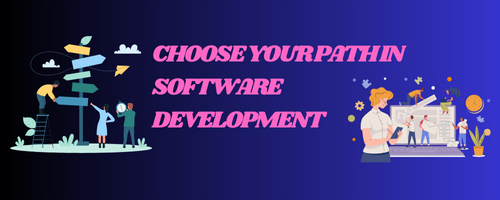
- Web developers: Build and maintain the websites and web applications we use every day. They focus on both the front-end (user interface) and back-end (server-side) aspects of web development.
- Mobile developers: Create applications specifically designed for smartphones and tablets. They work with platforms like Android and iOS, using specialized tools and programming languages.
- Game developers: Bring video games to life! They combine programming skills with artistic vision to create immersive and engaging gaming experiences.
- Software engineers: Focus on the design, development, and testing of large-scale software systems. They often work on complex projects requiring a deep understanding of computer science principles.
This is just a glimpse into the different paths available. By exploring your interests, you can find a niche that aligns with your passions and career goals.
Learn Essential Programming Languages
Programming languages are the tools that software developers use to build software. Here are some of the most in-demand languages to get you started:
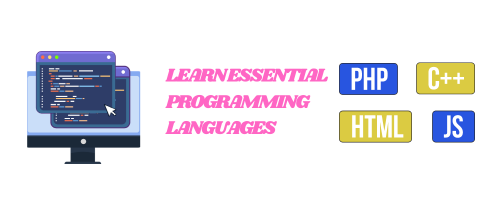
- Python: Known for its readability and beginner-friendliness, Python is a versatile language used for web development, data science, and machine learning.
- Java: A powerful and widely used language, Java is popular for enterprise applications and Android development.
- JavaScript: The lifeblood of the web, JavaScript is essential for creating interactive front-end experiences.
- C++: Offering high performance and control, C++ is a powerful language used for game development, system programming, and performance-critical applications.
Don’t feel overwhelmed by the options! Start with a language that aligns with your chosen development path. Many online resources, tutorials, and coding bootcamps can help you master these languages at your own pace.
Gain Education and Training
There’s no one-size-fits-all approach to education in software development. Here are some options to consider:
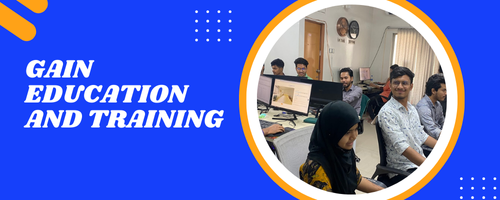
- Formal Degrees: Bachelor’s degrees in Computer Science or Software Engineering provide a strong foundation in programming languages, algorithms, and software development principles. However, these programs can take several years to complete.
- Coding Bootcamps: These intensive programs offer a fast-paced learning experience, equipping you with practical coding skills in a shorter timeframe (often months). Bootcamps can be a great option for career changers or those looking to enter the field quickly.
- Online Courses and Tutorials: Numerous online platforms offer affordable courses and tutorials on various programming languages and development concepts. This is a flexible option that allows you to learn at your own pace.
- Self-Learning: Highly motivated individuals can teach themselves to code through online resources, books, and practice projects. Dedication and discipline are key ingredients for success with this approach.
The best path for you depends on your learning style, budget, and career goals. Consider factors like time commitment, cost, and desired level of structure when making your decision.
Build a Strong Portfolio
Your portfolio is your digital calling card, a platform to showcase your coding skills and development prowess to potential employers. Here’s how to create a portfolio that grabs attention:

- Focus on Quality over Quantity: Include a handful of well-developed projects that demonstrate your abilities in different areas. Aim for projects that solve real-world problems or showcase unique features.
- Provide Clear Descriptions: Briefly explain each project’s purpose, the technologies used, and the challenges overcome. Highlight your specific contributions and areas of responsibility.
- Make it User-Friendly: Choose a platform that allows for easy navigation and mobile responsiveness. Ensure your code samples are well-formatted and readable.
- Consider Adding Live Demos: If possible, include live demos of your functional applications to give employers a firsthand experience of your work.
- Keep it Updated: Regularly add new projects to your portfolio as you develop your skills and tackle new challenges.
Remember, your portfolio is a dynamic document that grows with your experience. Invest time in creating a professional and engaging showcase that effectively communicates your value as a software developer.
Master Development Tools and Environments
Software development isn’t just about writing code; it’s about using the right tools to write it efficiently and effectively. Here are some key tools and environments you’ll encounter:
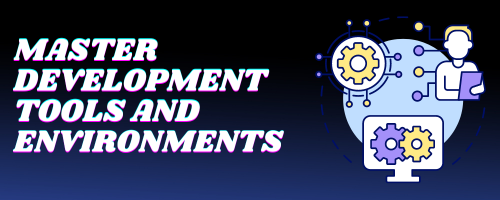
- Integrated Development Environments (IDEs): These comprehensive platforms offer code editing, debugging, testing, and project management functionalities in one place. Popular options include Visual Studio Code, IntelliJ IDEA, and Eclipse.
- Version Control Systems (VCS): Tools like Git allow developers to track changes made to code, collaborate effectively on projects, and revert to previous versions if needed. Mastering a VCS is essential for professional software development.
- Debugging Tools: Debuggers help identify and fix errors in your code. They allow you to step through your code line by line, inspect variables, and pinpoint the source of issues.
- Testing Frameworks: These frameworks automate the testing process, ensuring your code functions as intended across different scenarios. This helps prevent bugs and ensures a high-quality product.
Learning these tools will not only enhance your coding skills but also make you a more valuable asset to any development team.
Develop Soft Skills
Being a successful software developer goes beyond just writing code. Here are some crucial soft skills to cultivate:

- Communication: Software development is rarely a solitary pursuit. You’ll need to explain complex technical concepts to colleagues, clients, and stakeholders. Clear and concise communication is key to successful collaboration.
- Problem-solving: The ability to break down complex challenges into manageable steps and identify creative solutions is essential for troubleshooting code and overcoming development hurdles.
- Teamwork: Software projects often involve collaborating with designers, testers, and other developers. Effective teamwork skills allow you to work harmoniously towards a common goal.
- Time Management: Juggling multiple tasks, meeting deadlines, and prioritizing effectively are crucial aspects of a software developer’s role. Strong time management keeps projects on track and ensures efficient workflow.
- Adaptability: The tech industry is constantly evolving. The ability to learn new technologies, adapt to changing priorities, and embrace continuous learning is essential for long-term success.
By honing these soft skills alongside your technical expertise, you’ll be well-positioned to thrive in the dynamic world of software development.
Network and Connect with the Community
The software development world is a vibrant community filled with passionate individuals. Here’s why building connections is crucial for your success:
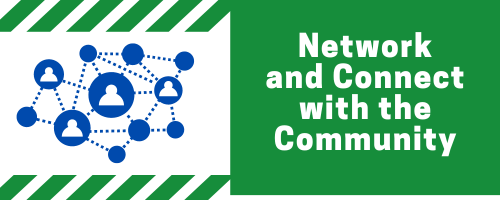
- Learning and Growth: Networking with experienced developers allows you to learn from their expertise, gain valuable insights, and stay updated on the latest trends and technologies.
- Finding Mentorship: Connecting with mentors can provide guidance, support, and career advice as you navigate your software development journey.
- Job Opportunities: Many companies look for candidates within their networks. Building connections can open doors to exciting job opportunities you might not find elsewhere.
- Collaboration: The developer community thrives on collaboration. By connecting with like-minded individuals, you can find potential collaborators for future projects and foster a sense of belonging within the tech industry.
Here are some ways to get involved:
- Attend meetups and conferences: These events provide excellent opportunities to network with other developers, learn from industry leaders, and stay abreast of the latest advancements.
- Join online communities: Numerous online forums and social media groups connect developers across the globe. Participate in discussions, share your knowledge, and learn from others’ experiences.
- Contribute to open-source projects: Contributing to open-source projects allows you to collaborate with developers worldwide, showcase your skills to potential employers, and gain valuable real-world experience.
Building a strong network takes time and effort, but the rewards are significant. By actively engaging with the developer community, you’ll accelerate your learning, discover new opportunities, and become a well-rounded software developer.
Prepare for Job Applications and Interviews
Landing your dream software development job requires a well-crafted strategy. Here’s how to prepare for the application and interview process:

- Tailor Your Resume and Cover Letter: Highlight relevant skills and experience that align with the specific job description. Quantify your accomplishments whenever possible (e.g., “reduced development time by 20%”).
- Practice Your Coding Skills: Regularly solve coding challenges on platforms like LeetCode or HackerRank to sharpen your problem-solving abilities and coding fluency.
- Prepare for Behavioral Questions: Be ready to answer common behavioral interview questions using the STAR method (Situation, Task, Action, Result). This helps demonstrate your past experiences and how you tackled challenges effectively.
- Research the Company: Learn about the company’s culture, values, and current projects. Show genuine interest and enthusiasm for the opportunity.
- Prepare Your Own Questions: Having thoughtful questions for the interviewer demonstrates your curiosity and initiative. Ask questions about the team, the role’s responsibilities, and the company’s future plans.
Remember, the interview is a two-way street. It’s your chance to assess if the company and role are a good fit for your skills and career goals.
Continue Learning and Growing
The world of technology is constantly evolving, and software development is at the forefront of this change. To stay relevant and competitive, a commitment to lifelong learning is essential. Here’s how to cultivate a growth mindset:

- Stay Updated with New Technologies: New programming languages, frameworks, and tools emerge all the time. Allocate time to learn and experiment with these advancements to keep your skillset relevant.
- Follow Industry Leaders and Blogs: Subscribe to blogs and social media channels of tech influencers and thought leaders. Gain valuable insights into industry trends and upcoming technologies.
- Take Online Courses and Workshops: Numerous online platforms offer affordable courses and workshops on new technologies and development concepts. Continuously expand your knowledge base and refine your skills through ongoing learning.
- Contribute to Open-Source Projects: Stay engaged with the developer community by contributing to open-source projects. This allows you to stay current with the latest advancements, collaborate with talented individuals, and showcase your expertise to potential employers.
Embrace the challenge of continuous learning. The more you learn and grow, the more valuable you’ll become as a software developer and the more fulfilling your career journey will be.
Conclusion
How to become a software developer is a journey that requires dedication, continuous learning, and practical experience. By understanding the role, choosing your path, learning essential languages, and mastering tools, you build a solid foundation. Developing soft skills, networking, and staying updated further enhance your career prospects. Follow these steps, and you’ll be well on your way to becoming a successful software developer.






